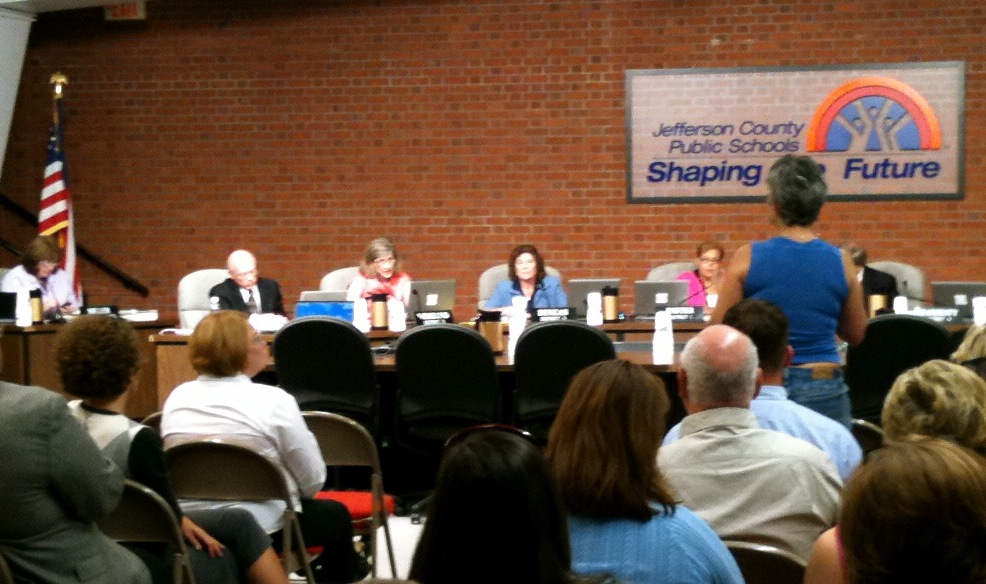“Don’t make history a mystery” read one of the signs at a rally in Jefferson County, Colo. High-school students in this suburban district, referred to locally as “JeffCo,” have been walking out of class en masse this past week, protesting the planned censorship of the district’s Advanced Placement (AP) United States history curriculum by the local school board. The board proposed a committee that would review the course, and others, adding material to “promote citizenship, patriotism, essentials and benefits of the free-market system, respect for authority and respect for individual rights,” as well as eliminating anything the board thought could “encourage or condone civil disorder, social strife or disregard of the law.” The student walkout coincided with several days of “sick-outs” by teachers. Ironically, the school board’s attempts to stifle teaching about the history of protest in the United States has provoked a growing protest movement.
School boards have long been an electoral target of the right-wing in the U.S. In JeffCo, the current conservative majority won a narrow victory in November 2013, an off-year election with low voter turnout. “About 33 per cent of the total population that could vote voted. Elections matter, and especially school-board elections,” John Ford said on the Democracy Now! news hour. He’s a social studies teacher at Moore Middle School and the president of the Jefferson County Education Association, representing more than 5,000 teachers, librarians, counsellors and other employees of the district.
The power of school boards is often underestimated. “I’ve been paying attention to the school board for the past year, and I have been increasingly concerned about what’s been going on,” Ashlyn Maher told me. She is a senior at Chatfield High School who helped organize the student walkouts. Civil disobedience has a long and storied role in U.S. history. The Declaration of Independence itself, so cherished by conservatives and progressives alike, instructs “Governments are instituted among Men, deriving their just powers from the consent of the governed … That whenever any Form of Government becomes destructive of these ends, it is the Right of the People to alter or to abolish it.” Maher says that disobedience is “the foundation of our country. I took AP U.S. history myself, and all I was presented with were the facts. And then I made the opinions based on those facts. I was never told what to think.”
The teachers also have been battling the board majority since it took power. “We’ve had a long history of collaboration with the school board and the superintendent. And that’s all coming to an end,” Ford said.
A national, right-wing political group, Americans for Prosperity, which is funded by the billionaire Koch brothers, celebrated the conservative victory in the JeffCo school-board elections. Dustin Zvonek, the Colorado state director for the group, wrote last April that the election marked “an exciting and hopeful moment for the county and school district.” Exhorting the three-member majority “to strike while the iron is hot,” Zvonek may not be the best adviser, though. “Board members can and should begin exploring and debating such options with little fear of alienating the public at large,” he wrote.
Well, the public is largely alienated. High-school students continue to organize, and were just recently joined by local middle-school students, who also walked out. Local college and university professors have formed a solidarity group. On Wednesday, the National Coalition Against Censorship, the American Civil Liberties Union and eight other national groups sent a letter to the school board condemning the proposed curriculum review: “It would be nearly impossible to teach U.S. history without reference to ‘civil disorder,’ which is appropriately discussed in connection with the American Revolution, the labor movement, civil rights and gay rights activism, U.S. entry into World War I, voting rights protests, public demonstrations against the war in Vietnam, opposition to abortion, government surveillance, and countless other significant events in U.S. history. Telling schools that they cannot use materials that ‘encourage or condone civil disorder’ in addressing these and other historical events is tantamount to telling them to abandon the teaching of history.”
It’s not only advocacy groups weighing in. The College Board, which runs the both the SAT college exams and the Advanced Placement program, issued a statement supporting the students’ protests, adding, “If a school or district censors essential concepts from an Advanced Placement course, that course can no longer bear the ‘AP’ designation.”
Ashlyn Maher, undeterred by a Fox News Channel anchor who labelled the student protesters “pawns” and “punks,” reflected before heading off to school: “This issue does not stop affecting me when I graduate. I have a little brother and a little sister who will grow up in the JeffCo community, and I want them to have the best education possible.”
And an education is certainly what the new school-board majority has given the community. The students are getting — and giving — a first-class lesson in the power of protest and civil disobedience.
Denis Moynihan contributed research to this column.
Amy Goodman is the host of Democracy Now!, a daily international TV/radio news hour airing on more than 1,200 stations in North America. She is the co-author of The Silenced Majority, a New York Times bestseller.
Photo: GabeB/flickr



